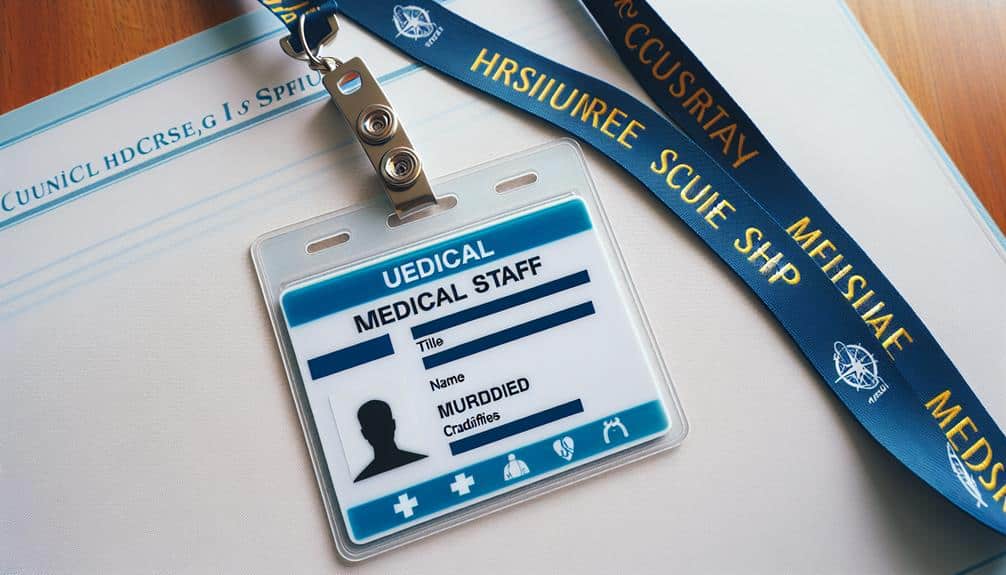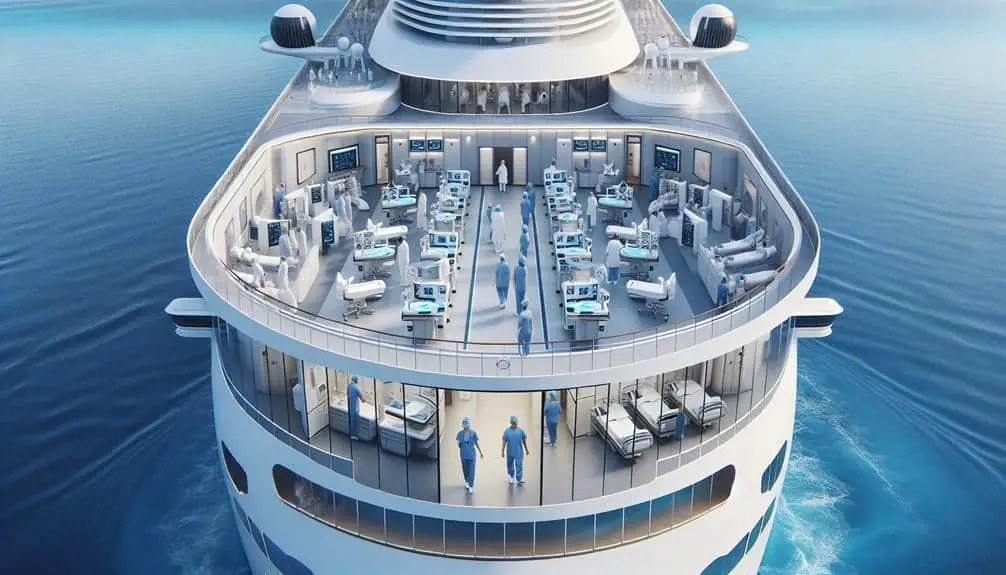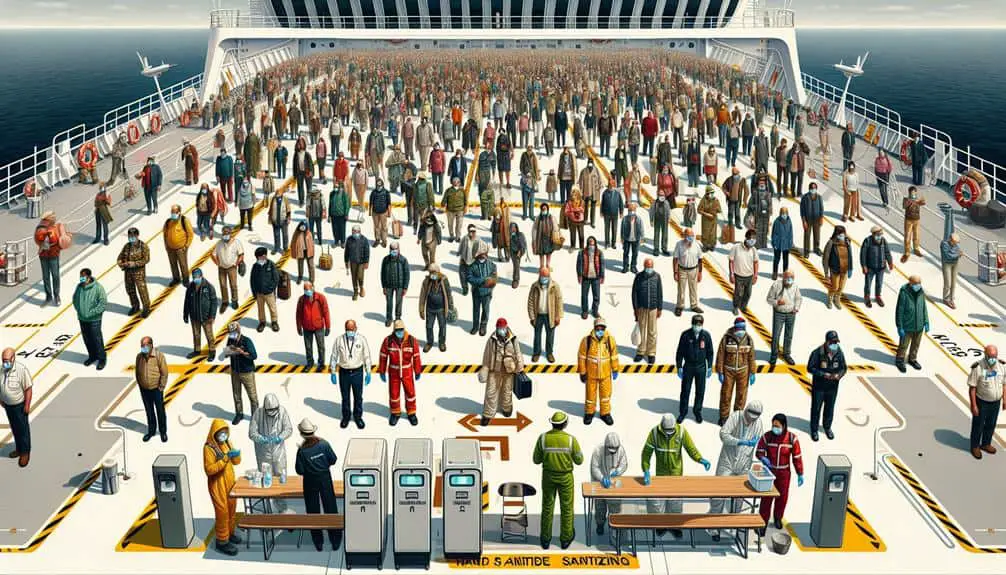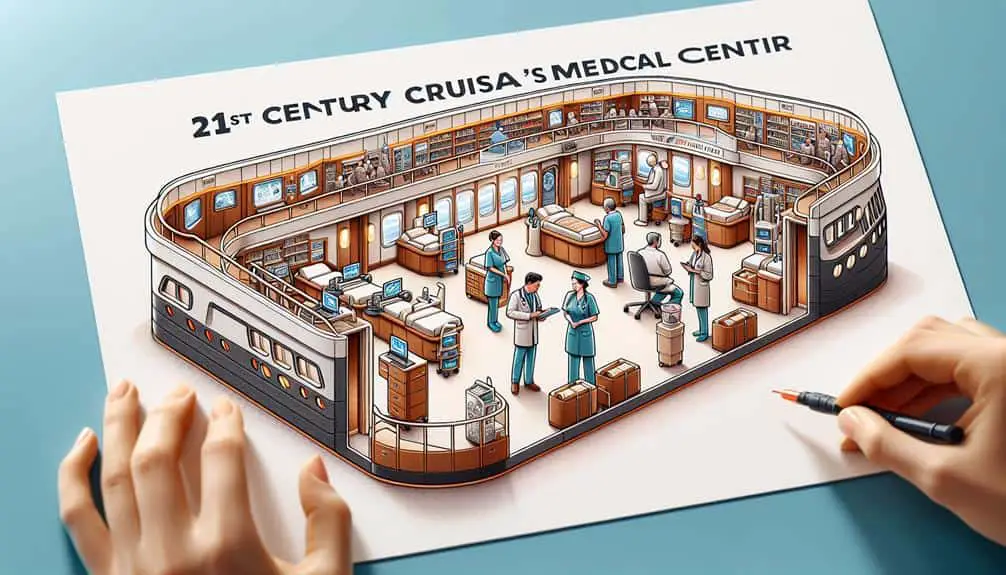To guarantee medical staff qualifications on cruise ships, verify valid licenses and conduct compliance audits. Specialized training enhances staff capabilities in maritime medicine, including simulation training for diverse scenarios. Continuous education is vital, covering emergency medicine and evolving practices. International certification ensures global standards are met through rigorous testing. Language proficiency is essential for effective communication with patients. Meticulous processes and training guarantee top-tier care at sea. Be diligent in verifying licenses and stay updated with ongoing education – essential elements for maintaining high-quality healthcare services on cruise ships.
Key Points
- Verify valid and up-to-date medical licenses for all staff.
- Provide specialized maritime medicine training for staff.
- Ensure continuous education for staff to stay updated.
- Require international medical certification for staff.
- Emphasize language proficiency for effective communication.
Mandatory Medical Licenses for Staff
Verifying that all medical staff aboard cruise ships possess valid and up-to-date medical licenses is crucial for upholding the highest standards of care and safety for passengers and crew. License validation is a vital process that ensures the medical personnel on board are qualified to deliver the necessary healthcare services in a maritime setting. Compliance audits are carried out regularly to confirm that every staff member's license is current and in good standing.
During these compliance audits, each medical staff member's credentials are carefully examined to validate that they meet the required criteria for practicing medicine at sea. These audits act as a proactive measure to maintain the quality of healthcare services provided onboard and to guarantee that passengers and crew receive the best possible care in the event of medical emergencies.
Specialized Training Requirements
To further enhance the medical staff's capabilities in providing exceptional healthcare services onboard, specialized training requirements tailored to the unique challenges of maritime medicine are rigorously implemented. Simulation training plays an important role in preparing medical personnel for the diverse medical scenarios they may encounter at sea. Through simulated exercises, medical staff can hone their diagnostic skills, practice emergency procedures, and enhance their decision-making abilities in high-pressure situations.
Emergency response skills are a cornerstone of the specialized training requirements for medical staff on cruise ships. Training in rapid and effective responses to medical emergencies such as heart attacks, strokes, or traumatic injuries is essential to ensuring the well-being of passengers and crew members. By mastering emergency protocols and procedures, medical staff can provide timely and life-saving interventions when every second counts.
Continuous Education Standards
In maintaining high standards of care and expert knowledge, continuous education remains an essential component for the medical staff aboard cruise ships. To guarantee that medical professionals stay updated with the latest advancements and best practices, online courses are a valuable tool. These courses cover a wide range of topics, from emergency medicine to infectious disease management, tailored to meet the specific needs of medical staff working in a maritime environment.
By participating in online courses, medical staff can enhance their skills, stay informed about updated guidelines, and learn new techniques that can greatly benefit the passengers and crew on board. Continuous education not only sharpens existing competencies but also introduces staff to innovative approaches in healthcare delivery. It fosters a culture of lifelong learning and ensures that medical personnel are well-prepared to handle any medical situation that may arise during a cruise.
Staying abreast of new developments through continuous education is essential for maintaining the highest standards of care and expertise in the ever-evolving field of maritime medicine.
International Medical Certification
International medical certification is crucial for cruise ship medical staff to meet globally recognized standards of care. It involves rigorous testing and accreditation programs to verify the staff's competency. By adhering to these standards, cruise ships ensure their medical teams are well-prepared for various medical situations. Standardized testing evaluates staff knowledge and abilities across medical topics, ensuring quality care for passengers and crew. Accreditation programs help maintain high standards, accountability, and opportunities for continuous learning. Overall, international certification ensures cruise ship medical staff have the necessary qualifications and skills for safe and effective healthcare services at sea.
Standardized testing plays a crucial role in evaluating medical staff's knowledge and abilities. These tests cover a variety of medical topics to ensure healthcare providers possess the expertise needed to deliver quality care to passengers and crew members. Participation in accreditation programs helps maintain high standards of medical practice by holding staff accountable for their performance and providing opportunities for continuous learning and improvement. International medical certification is vital for ensuring that cruise ship medical staff have the qualifications and skills needed to deliver safe and effective healthcare services while at sea.
Language Proficiency Expectations
Ensuring medical staff possess sufficient language proficiency is vital for effective communication with patients and crew members on cruise ships. Cultural sensitivity plays a critical role in understanding diverse backgrounds and providing compassionate care. Medical professionals must be skilled in the language commonly spoken among passengers and crew to guarantee clear communication during emergencies.
Language barriers can impede the delivery of proper medical care and adherence to emergency protocols. Misunderstandings due to language differences may lead to serious consequences. Hence, it's essential for medical staff to undergo language proficiency assessments to confirm they can effectively convey critical information and instructions.
In addition to verbal communication, non-verbal cues and gestures should also be considered when interacting with individuals from various cultural backgrounds. By promoting cultural sensitivity and linguistic competence, medical staff can foster trust and cooperation among the cruise ship community, ultimately enhancing the quality of care provided onboard.
Frequently Asked Questions
Are There Specific Age Requirements for Medical Staff Working on Cruise Ships?
Age requirements for medical staff on cruise ships vary based on position and country regulations. Training frequency is essential to make sure skills are up to date. Stay informed about specific requirements to excel in this field.
How Often Are Medical Staff Required to Undergo Re-Certification or Re-Training?
Imagine the rhythm of your talents harmonizing with the sea breeze. Medical staff on cruise ships typically undergo re-certification every two years and engage in regular training sessions to guarantee excellent care for passengers.
Do Cruise Ships Have a Maximum Ratio of Passengers to Medical Staff?
On cruise ships, staffing ratios are essential for passenger safety. Regulations often mandate a maximum number of passengers per medical staff member. Ensuring qualifications and adequate staffing levels is paramount to meet regulatory standards and provide quality care.
Are There Any Specific Medical Conditions or Specialties That Medical Staff Must Be Proficient in Treating on Cruise Ships?
When it comes to specialized treatments and emergency response on cruise ships, international regulations mandate that medical staff must be proficient in handling various medical emergencies. This guarantees the safety and well-being of passengers.
What Measures Are in Place to Ensure That Medical Staff Have Access to Up-To-Date Medical Equipment and Resources While Working on Board?
To guarantee medical staff have access to state-of-the-art medical equipment and resources on board, cruise ships maintain strict equipment maintenance schedules, offer thorough training programs, implement emergency protocols, and utilize efficient communication systems for swift response to medical situations.



